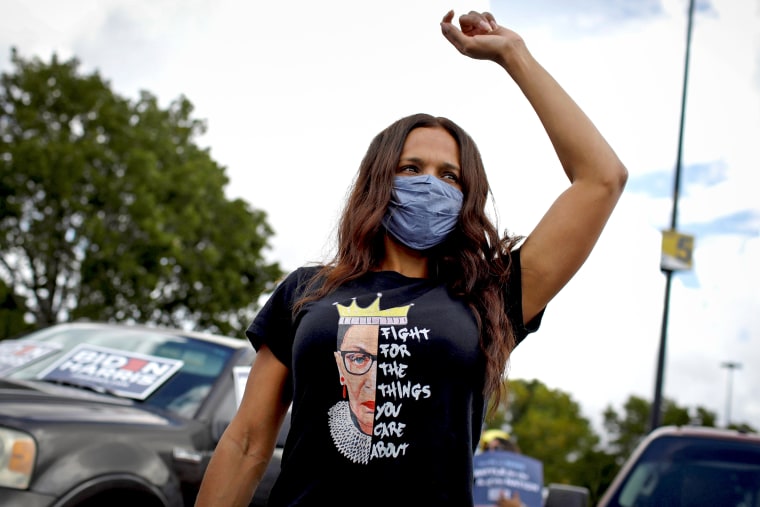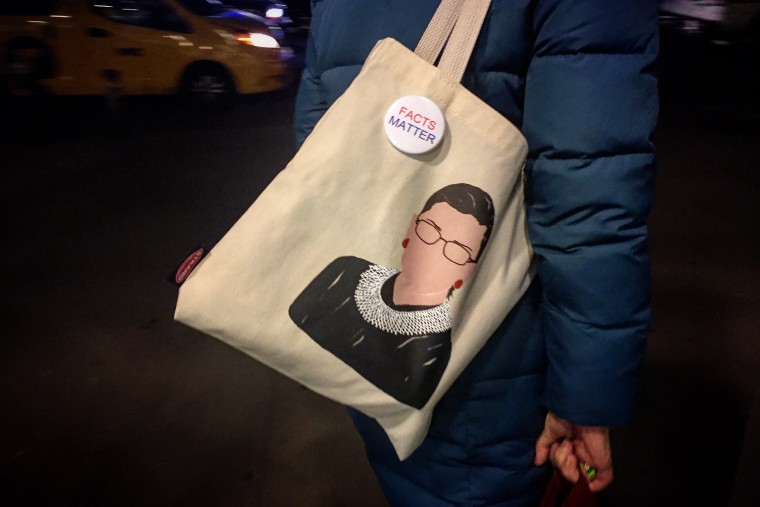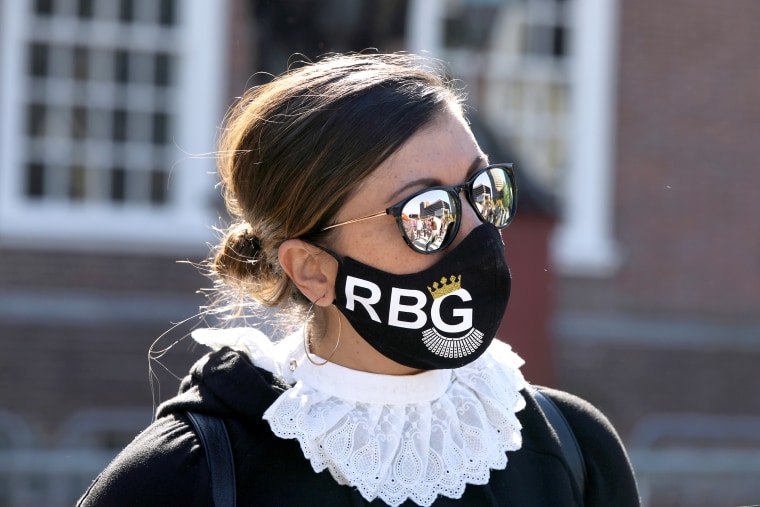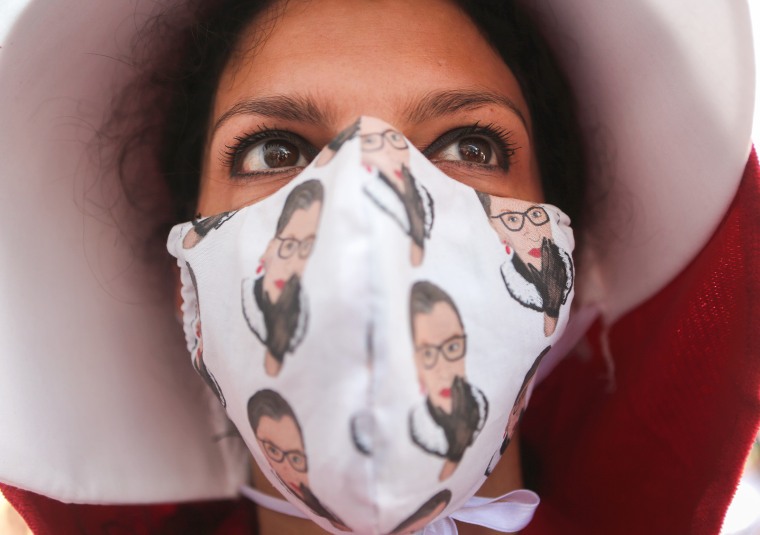WASHINGTON — From Boston to Austin, from Portland, Oregon, to Portland, Maine, Ruth Bader Ginsburg has been the undisputed queen of the tote bag for left-leaning Americans looking to show their support for women's empowerment or opposition to former President Donald Trump.
But Trump is now out of office and as independent bookstores, boutiques and cafes are reopening to serve up lattes and a little impulse buying after a year full of pandemic and politics, plus the death of Ginsburg, retailers are looking for who will be next to adorn kitsch.
Many up-and-coming politicos probably covet the unique spot Ginsburg holds in liberal hearts and tchotchkes. But according to the people who make and sell political books and baubles, it's unclear who will take her place — or if liberals even want to keep broadcasting their politics on their air fresheners and keychains after so many years of all-consuming political consumption.
“I don't think she's been de-crowned at this point. I just don't know who's going to take up the torch as the icon of the sort of indie bookstore,” said Gavin Inverso, the owner of Austin-based Illuminidol, which makes prayer candles and other curios featuring celebrities and political figures.
Leah Kenyon, the sidelines buyer for Politics and Prose, the famed Washington bookseller owned by Hillary Clinton’s former speechwriter and her husband, said there's "nobody who's at the level of RBG, though "people are definitely buying a lot of Kamala [Harris]."

On the right, there’s no question about who moves the most merch: Trump.
The National Republican Senatorial Committee, for instance, sells T-shirts with photos of Trump and messages like, “Miss me yet?” and “Still my president,” even as the group prepares to defend senators from potential Trump-backed primary challenges, such as Sen. Lisa Murkowski, R-Alaska, who voted to impeach the former president.
On the left, President Joe Biden does well, but is hardly dominant. Dr. Anthony Fauci had a moment, but he’s no longer the scientific and emotional counterweight to Trump’s handling of the Covid-19 pandemic. Familiar figures like House Speaker Nancy Pelosi and Barack and Michelle Obama still do OK.
But most have their eyes on a cadre of women of color: Vice President Harris; Rep. Alexandria Ocasio-Cortez, D-N.Y.; former Georgia gubernatorial candidate Stacey Abrams; and Supreme Court Justice Sonia Sotomayor, who wrote an autobiographical children’s picture book in 2018.
“There is new merchandise with her (Ginsburg’s) image coming out regularly, and she is probably the most prevalent figure I can think of,” said Cassie Swank, the gifts buyer at Austin’s BookPeople, Texas’ largest independent bookstore. “Where we might have an AOC sticker, greeting card and enamel pin, there are probably five times as many RBG greeting card and sticker options, three times as many enamel pin options, and then at least 10 more other categories to choose from.”
Being the inspiration for a line of novelty socks may not get you elected president. But it is a sign of political and cultural cachet in a world where the two realms are quickly merging and public figures are competing for attention and fandom in both.

“(Selling merchandise) says that your appeal translates and really pushes you out of the political sphere and almost into a pop cultural sphere,” said Erick Sanchez, a political consultant who runs a side hustle selling throw pillows featuring Fauci. “It's a sign of understanding the emotional value of what Americans are thinking about.”
The “notorious RBG” phenomenon was a mystery to Ginsburg during her lifetime. While Ginsburg’s political views were clear, her status on the court let her keep her robes clean of the pandering and pummeling of partisanship and allowed her to retain an aura of intellectual and moral purity with no need to compromise or respond to the crisis du jour.
Mike Draper, the founder and owner of the Iowa-based T-shirt shop RAYGUN said Ginsburg was a merchandiser’s dream in part because she had a perfect mix of “serious yet campy.” His shop has become a must-stop for Democratic presidential hopefuls courting voters in the early primary state.
“You didn't really expect this small old woman to have a workout routine and be kind of a badass,” he said. “She had those neck things that she wore so you can create RBG merchandise without even using her face or her name. This has got all the elements of something that is going to be marketable.”
But Draper and others think there may not be a new RBG because people want a break from politics after four years of Trump and the pandemic.
When an image went viral of Sen. Bernie Sanders, I-Vt., crossing his arms at Biden’s inauguration, Draper thought to himself, “This might be the last marketable political thing we have for a while.”
At Powell’s, the indie book mecca in Portland, Oregon, marketing coordinator Emily Brodowic said cultural figures with “more uplifting” messages have been gaining steam, such as pop star Lizzo, “Queer Eye” star Jonathan Van Ness and tennis champion Naomi Osaka.
“The search for political heroes (RGB, AOC, Kamala, Biden) was at its peak during the Trump administration, and at least in Portland now that people feel less threatened by the government they are looking for icons outside of politics,” she said.
The Unemployed Philosophers Guild, a Brooklyn-based maker of “smart gifts for smart people,” sells everything from “Freudian Slippers” (get it?) and mugs featuring Shakespearean insults to “Trump’s small hand soap.”

It has an entire product category dedicated to Ginsburg — finger puppets, mugs, stickers, “I dissent” pins, “judgemints” breath fresheners and more — and Trudi Bartow, the company’s sales director, said RBG sales still spike when the Supreme Court hands down a major decision, even though she’s no longer on the bench.
“We can't really anticipate what will be the next big seller,” she said. “It spikes naturally and organically — you can't make this stuff happen — you just have to sort of hope you have the product when it happens.”
There’s no rule that requires quaint shops in quaint towns to sell political lip balm or shirts with lefty slogans on them.
But the people who chose to open independent bookstores tend to lean left, as do the people who tend to shop in them, so they're often in liberal areas, said John Mutter, the editor in chief of the bookstore trade publication Shelf Awareness.
And “sidelines,” as nonbook products are known in the industry, have become a critical part of the bottom line because they offer better profit margins than books and can bring in new customers or add a few dollars of impulse purchase to a sale. “There's only a few indie bookstores that sell only books,” said Mutter.
Political sidelines are typically a small portion of bookstores’ revenue, but during the Trump era, everyone got into the “resistance” game with “covfefe” mugs and “nasty woman” necklaces. But that boom may be headed for a bust since no one wants Trump's tweets on their T-shirts and toilet paper anymore.
"We're just going through a cycle where people are just less interested in politics all together," said Janie Velencia, a former Washington political reporter who quit to focus on The Card Bureau, the stationary and gift company she founded. "I think after people have had a bit of a break, they'll return to engaging more."

